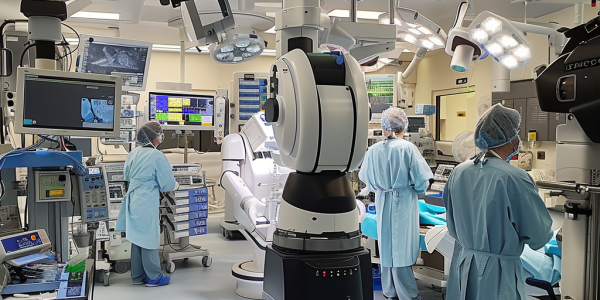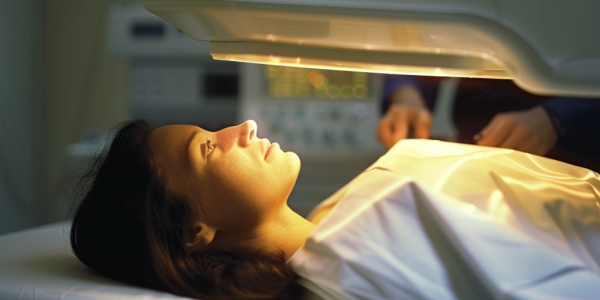West Herts NHS Trust Implements Cutting-Edge Robotic Surgery Technology
West Herts NHS Trust has implemented cutting-edge robotic surgery technology to enhance patient outcomes and revolutionize surgical procedures. With the acquisition of advanced robotic systems, including the Cambridge CMR Versius and Intuitive da Vinci robots, the trust is at the forefront of innovative healthcare. Robotic surgery enables cancer patients to return home within 24 hours post-operation, improving patient care. The trust has performed nearly 400 operations and expanded its capabilities with the da Vinci XI system, allowing for more complex operations with enhanced precision. Benefits include reduced pain, minimal blood loss, and faster recovery times. The integration of robotic surgery has improved staff training, morale, and operational efficiency, showcasing its transformative impact on surgical practices.
The Emergence of Selectively Advantageous Instability in Biology
Discover how the concept of ‘selectively advantageous instability’ (SAI) is challenging traditional ideas of stability and evolution in biology. Professor John Tower from USC Dornsife explains how a certain level of instability in biological components can be beneficial for cells, leading to increased genetic diversity and adaptability. Learn about the dual nature of instability in biology and its implications for cellular resources and energy consumption.
CDC Warns of Salmonella Outbreaks Linked to Backyard Poultry
Learn about the dangers of salmonella outbreaks linked to backyard poultry and how to protect yourself and your family. The CDC warns of the risks associated with handling live poultry and provides recommendations to reduce the risk of infection, including washing hands thoroughly and avoiding close contact with the birds.
Decline in Prostate Cancer Screening Raises Concerns and Sparks Debate
Learn about the significant decline in prostate cancer screening rates following the 2012 recommendation against routine testing. Discover the varied reactions within the medical community and the impact on prostate cancer diagnoses. Find out how recent studies have shed light on the consequences of decreased PSA testing and the potential benefits and risks associated with the shift away from routine screenings.
Concerns Rise as Four More Cats Succumb to Highly Pathogenic Avian Flu H5N1
Recent reports reveal that four more cats have succumbed to the highly pathogenic avian flu H5N1, raising concerns about efficient mammal-to-mammal transmission. The total number of feline fatalities now stands at 14 since Spring 2024, with 24 cats falling victim to H5N1 in the past two years. Learn more about the concerning trend and the ‘B3.13 genotype’ emergence in this article.
Study Links Prenatal Exposure to Endocrine-Disrupting Chemicals to Increased Risk of Metabolic Syndrome in Children
A recent study by the Barcelona Institute for Global Health found a concerning link between prenatal exposure to endocrine-disrupting chemicals (EDCs) and an increased risk of metabolic syndrome in children. The research, published in JAMA Network Open, highlights the potential long-term health implications of EDC exposure and emphasizes the need for further research and public health initiatives to address these risks.
Ultrasound Waves: Revolutionizing Brain Disorder Treatment
Discover how ultrasound waves are revolutionizing the treatment of brain disorders by targeting specific regions with precision, offering a non-invasive and effective alternative to traditional methods. Learn how transcranial ultrasound stimulation (TUS) is being used to treat conditions like depression, anxiety, and addiction, providing hope for those struggling with psychiatric disorders.
Global Health Trends: Insights from Comprehensive Study
The Global Burden of Diseases study published in The Lancet highlights the impact of COVID-19 on global health loss, with neonatal diseases, heart disease, and stroke remaining significant contributors. The research underscores the importance of addressing non-communicable diseases and strengthening healthcare systems to improve health outcomes worldwide.
Swiss Researchers Develop Milk-Based Gel to Revolutionize Alcohol Metabolism
Swiss researchers have developed a groundbreaking milk-based gel to revolutionize alcohol metabolism, aiming to reduce liver damage by converting alcohol into harmless acetic acid. Initial experiments on mice show promising results, with the gel reducing alcohol levels by 56% and decreasing acetaldehyde accumulation. While not a remedy for alcohol poisoning, this innovative gel offers a safer approach to alcohol consumption for those looking to prioritize their health.
Travelers Urged to Check Vaccination and Medication Requirements Before Summer Holidays Due to Rise in Malaria Cases
Travelers are urged to check vaccination and medication requirements before summer holidays due to a notable increase in travel-acquired malaria cases. Data from the UK Health Security Agency revealed over 2,000 imported malaria cases in 2023, marking a significant rise. Malaria, caused by parasites from mosquito bites, can be prevented with anti-malarial tablets and vaccines for other infections. Precautions such as using insect repellent and taking prevention tablets can reduce the risk of infection.










